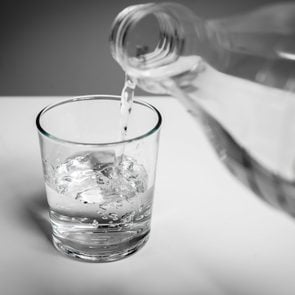Alkaline Water: What Is It and Does It Have Benefits?
Updated: Dec. 01, 2021
Does alkaline water live up to its hype? Here's what the experts have to say about this hydration trend, its benefits, and possible risks.
What is alkaline water?
There’s no debate about it: Drinking enough water is essential for great health. Nutrition experts and researchers agree drinking enough water and maintaining proper hydration can improve everything from your memory and mood to digestion and skin condition.
But in recent years, there’s been a buzz around different types of water, such as alkaline water.
The concern is about the pH of the water we drink. This term pH stands for the “potential for hydrogen.” In a nutshell, pH describes something’s acidity, explains Morton Tavel, MD, a clinical professor emeritus of medicine at the Indiana University School of Medicine.
It’s a scale that ranges between 0 and 14. Anything with a pH less than 7 is acidic, and those greater than 7 are basic—also known as alkaline.
“Pure water has a pH very close to 7,” Dr. Tavel says. So the water coming out of your tap or bottle is more or less neutral, as far as its pH is concerned.
Alkaline water is simply water with a higher pH than regular drinking water, typically at a pH of 8 or 9, explains Inna Husain, MD, an associate professor of otolaryngology and section head of laryngology at Rush University Medical Center.
Here’s what you need to know about alkaline water, including alkaline water benefits, risks, and more.

How is alkaline water made?
“Water that’s naturally alkaline becomes that way by passing over rocks—like in springs—picking up minerals as it flows, which increases its alkaline level,” says registered dietitian Dana Hunnes, PhD, MPH, a senior dietitian at UCLA Medical Center.
But the branded alkaline water you see on the shelves is usually made with ionizers. These devices perform a chemical process called electrolysis to separate the water into two parts: alkaline and acidic. The acidic water is then filtered out, leaving behind a stream of alkaline drinking water.
There are also a few DIY tricks that will alkalize your water, too.
Even though fruits like lemons taste acidic, their pH rises once our body starts breaking down the fruit in our gut, explains Rachel Larkey, a registered dietician working in New York City and Seattle. That means adding a splash of lime or lemon juice to your water gives it an alkaline hit.
Is alkaline water good for you?
Alkaline water is part of a broader trend called the alkaline diet or the alkaline ash diet. The diet involves replacing acidic foods—such as processed foods and animal meat—with alkaline foods like fruits and vegetables.
“There’s a belief that our health will benefit from being in a more alkaline state,” says Larkey.
For example, a study published in Cancer Research found that cancer tumors are highly acidic, and this acidity helps a tumor spread and grow.
This idea leads people to believe that by eating more alkaline foods, we create an environment in which health problems like cancer can’t flourish, Larkey explains. But our body’s pH doesn’t shift in this way (and thankfully so—more on that below.)
There’s a wide range of other health claims attributed to alkaline water as well, according to Dr. Tavel.
“If you believe the marketing hype, alkaline water can increase your energy, boost your metabolism, hydrate you better than regular water, prevent digestive problems, neutralize acid in your bloodstream, help your body absorb nutrients more effectively, promote weight loss, prevent bone loss, and even slow aging,” he says.
“[But] no scientific studies have demonstrated any advantage.”
Do you need to alkalize your body?
“Every system in our body functions at a different pH,” Larkey says.
And it’s a tightly run ship. Dr. Tavel explains that unless you have certain medical conditions—like a kidney or respiratory disease—your body maintains healthy pH levels on its own.
Blood pH
Your kidneys and lungs are the two organs that regulate the acid-base balance of your blood.
“For example, if your blood becomes too acidic, you breathe out more carbon dioxide to bring the levels down,” Dr. Tavel says.
In fact, it would be a pretty big problem if drinking alkaline water could change our body’s pH levels, Larkey says. Our blood’s normal pH stands between about 7.35 and 7.45, and even a decimal-place change below or above that could be life-threatening.
For instance, conditions like diabetes can lead to acidosis, an acidic environment in the blood.
“And that’s deadly,” she says. “You can go into a coma pretty quickly.”
Or, if your blood is a bit too basic—a condition called alkalosis—it can lead to organ failure or heart attack.
Fortunately, drinking alkaline water won’t cause either of these states. According to the U.S. National Library of Medicine, blood acidosis or alkalosis occurs mainly due to situations like chronic diseases, severe dehydration, drug abuse, and poisoning.
Your urine pH
Research from the Nutritional Journal found that eating an alkaline diet does actually raise our urine pH. Still, that doesn’t mean you’re “alkalizing” your body.
Larkey explains that alkaline diet advocates sometimes cite this urine pH effect as proof the diet is working, thus justifying its health claims.
“It’s really just proof that your kidneys are already working well,” she says.
Your stomach pH
Our stomach needs a really acidic pH—about 1.5 to 3.5—in order to kill germs and kick-start digestion, Larkey says. And it’s not something food and drink can easily disrupt.
“Once alkaline water hits your stomach, the gastric juices will neutralize it,” Dr. Tavel says. “Another example of [the body’s] natural pH balancing.”
So, are there any alkaline water benefits?
There isn’t adequate scientific research to back up most alkaline water health claims—but it may offer a few potential benefits:
It might help with exercise recovery

“There is some slight evidence that [people] drinking alkalized mineral water may have improved hydration status after intense exercise,” Dr. Hunnes says.
A study published in Biology of Sport suggests alkaline water can also improve athletic performance and post-exercise recovery.
Still, the study is small, with only 36 participants. Plus, it focuses on young athletes consuming more than four liters of alkaline water per day.
It might help ease GERD symptoms
Alkaline water may also have a potential role in treating laryngopharyngeal reflux (LPR), the throat symptoms accompanying gastroesophageal reflux disease (GERD).
Dr. Husain says the digestive enzyme pepsin is responsible for LPR symptoms like a sore throat, cough, and difficulty swallowing.
“Pepsin can remain in the throat tissue and get reactivated when exposed to acid,” she explains.
Research published in Annals of Otology, Rhinology & Laryngology suggests alkaline water can “deactivate” this pepsin so it can’t do any more damage, possibly helping to treat LPR symptoms.
It’ll hydrate you
By and large, the main benefit of drinking alkaline water is hydration.
“If you like it, good; drink more water,” says registered dietitian nutritionist Wesley McWhorter, DrPH, an assistant professor of health promotion at the University of Texas Health Science Center at Houston and director of culinary nutrition with the nourish program at the UTHealth School of Public Health.
“I wouldn’t discourage people from drinking alkaline water because most people aren’t drinking enough water in general—and that’s the missing link,” he says. “But it’s not a magic pill.”
Are there any alkaline water side effects or risks?
Alkaline water is generally considered safe, explains Dr. Husain. She says too much alkaline water could theoretically lower your stomach’s natural acidity, limiting its ability to kill off bacteria.
It could also potentially alter gastrointestinal pH—which could increase someone’s risk for alkalosis, Dr. Hunnes says.
“Though you would really have to drink a lot,” she says.
As for the main risk of alkaline water? There may be no evidence behind weight-loss claims, but it can certainly slim your wallet.
“The cost of alkaline water is far more expensive and may not be any healthier than regular tap water,” Dr. Hunnes says, adding that tap water has stricter regulations.
Rachel says people should also be mindful of restrictive dietary patterns like the alkaline diet. On the one hand, you may miss out on important nutrients if you only eat alkaline foods.
“But a lot of people wind up developing eating disorders or disordered eating,” she explains.
“Even though there are features of these diets that can be helpful—like eating more vegetables—focus on what you can add [to your diet] rather than what you have to replace or take away.”

















